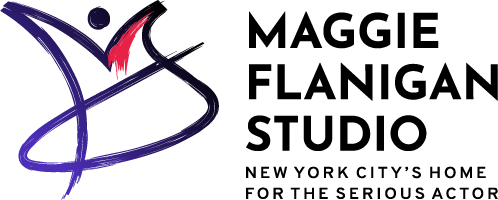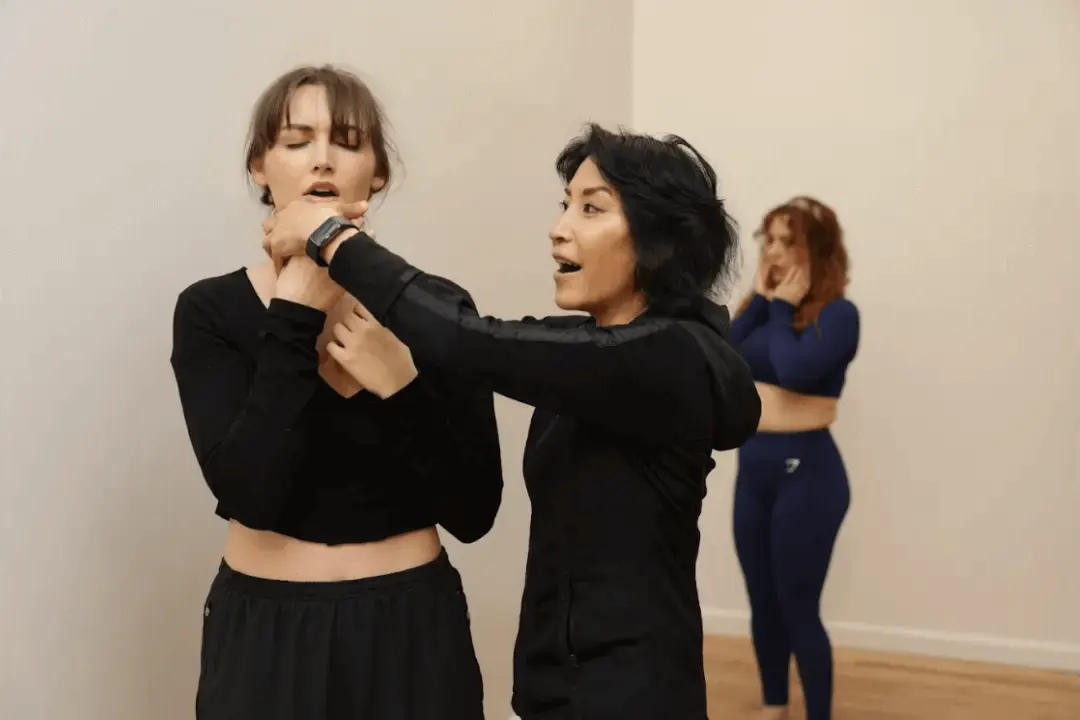APPLY FOR ADMISSION
FIRST YEAR MEISNER ACTING PROGRAM

Begins January 7th, 2025

Call To Schedule an Interview
(917) 794-3878
How to Study Voice Acting: A Step-by-Step Guide
Voice acting is an exciting career that combines acting skills with vocal performance. If you’re wondering how to study voice acting, taking NYC acting classes at renowned institutions like Maggie Flanigan Studio can provide the foundation you need.
Aspiring voice actors will learn the importance of honing their craft through practice and professional training. By understanding vocal performance and character development, you can greatly enhance your chances of landing voice-acting jobs.
This guide covers everything you need to get started in the voice acting industry, from setting up a home recording studio and creating compelling demo reels to finding voice acting opportunities.
With the right tools, training, and perseverance you can build a fulfilling career. Let’s dive into the key aspects of becoming a voice actor and explore the steps needed to excel in this dynamic field.
Key Takeaways
- Taking acting classes and working with a voice coach are essential steps to becoming a successful voice actor.
- Consistently auditioning, networking, and maintaining a strong online presence are crucial for landing voice-acting jobs.
- Setting up a professional home studio with the right equipment and soundproofing is vital for producing high-quality voiceovers.
What is Voice Acting?
Voice acting involves using your voice to convey characters, narrate stories, or provide information without appearing on screen.
Voice actors bring scripts to life through their vocal performances, making the content engaging and relatable. This art form requires a combination of acting skills, vocal range and control, and the ability to adapt your voice to match diverse genres.
Types of Voice Work
Voice acting offers a wide range of opportunities, allowing voice actors to explore various niches within the industry. Here are some of the primary types of voice work where you can apply your voice acting skills:
Animation and Video Games
Voice actors in animation and video games bring cartoons and interactive games to life by creating unique character voices.
This type of voice acting work requires versatility, as many voice actors perform multiple character voices, each with distinct personalities and emotions. A strong understanding of character acting and vocal control is essential in these roles.
Commercials
Commercial voiceovers involve promoting products and services in advertisements. A good voice actor must deliver the script in a way that resonates with the audience and aligns with the brand’s message.
Voiceovers for commercials can range from upbeat and enthusiastic to calm and authoritative, depending on the product and target audience. Most voice actors working in commercials need to showcase their versatility in their demo reel, highlighting their ability to adapt their voice for different brands.
Audiobooks
Narrating audiobooks demands consistent delivery and often requires developing multiple character voices.
Audiobook narrators must maintain the listener’s interest over long periods, ensuring that each character’s voice is distinct and that the narration is engaging. This type of voice-acting work highlights the importance of clear enunciation and vocal endurance.
Voice actors working on audiobooks often create different voices for various characters in conversation, showcasing their versatility.
Corporate Training and E-Learning
Voice actors in corporate training and e-learning provide informative and instructional voiceovers for corporate videos and online courses. This voiceover work involves conveying complex information clearly and effectively.
Aspiring voiceover artists must use their voice to make the content accessible and engaging, ensuring that learners can easily understand and retain the material.
Essential Skills for Voice Acting
To become a successful voice actor, you need to develop a range of essential skills that go beyond just having a great voice. Mastering these skills will help you excel in the voice-acting world and increase your chances of landing voice-acting jobs.
Here are the key skills you need to focus on:
Enunciation and Clarity
Voice actors must speak clearly so their audience understands every word.
Clear enunciation ensures your message is received accurately. Practicing enunciation will help you avoid sloppy speech, such as mumbling and slurring, which can detract from the quality of your voiceover work.
Vocal Pacing and Pausing
Controlling the speed of your delivery and using pauses effectively is crucial in voice acting.
Pacing ensures your audience can follow along easily. Strategic pauses can add emphasis and enhance the overall impact of your performance.
Inflection and Tone
Adjusting your voice to suit different types of material is vital. Depending on the project, your delivery might need to be entertaining, authoritative, or neutral.
Understanding how to use inflection and tone to convey the right emotion and message will make you a more versatile and effective voiceover artist.
Acting Skills
Strong acting skills are essential for bringing characters and scripts to life.
Voice actors need to portray a wide range of emotions and personalities, often within a single project. Taking acting classes can help you develop these abilities, making your character voices more believable and engaging.
Many successful voice actors regularly work with voice coaches to refine their acting techniques and improve their performances.
How to Set Up Your Recording Studio
To pursue a successful voice acting career, having a well-equipped recording studio is essential. Creating a quality recording space will significantly impact your voiceover work. This applies to both professional voice actors and aspiring ones.
A home recording studio doesn’t have to be expensive. Start with the basics and gradually upgrade your setup as you gain more voice-acting jobs.
Here’s what you need to set up your home recording studio:
- Microphone. A high-quality condenser microphone is crucial for capturing clear and professional audio. This is the heart of your recording studio, ensuring that your voiceovers sound polished and professional.
- Pop filter. A pop filter reduces unwanted plosive sounds, such as “p” and “b” noises, ensuring cleaner recordings. It’s a small but important investment for any voiceover artist as it enhances the overall quality of your audio files and makes your voice-acting work sound more professional.
- Audio interface. An audio interface connects your microphone to your computer, converting analog signals into digital format. A good audio interface is crucial for enhancing recording quality and ensuring smooth audio production.
- Headphones. Over-ear headphones are essential for monitoring your recordings. They help you catch any mistakes or unwanted noise. High-quality headphones ensure that your voice-acting work meets the standards required by casting directors and the voice-acting industry.
- Recording software. Programs like Adobe Audition or Audacity are essential for editing your audio files. These tools offer various features to enhance your recordings and create a great voice reel.
Soundproof Your Space
Creating a soundproof recording space is vital for producing high-quality voiceover work. A well-soundproofed environment ensures your recordings are clean and professional, free from external noise and echo.
Use heavy blankets or foam panels to minimize external noise and absorb sound reflections, creating a sound-flat environment ideal for voice acting. This setup helps in achieving consistent recording quality and top-notch audio files.
Investing in a professional recording booth can further enhance your recording space, but if that’s not feasible, a well-prepared home studio with proper soundproofing can still deliver excellent results.
Creating a Demo Reel
A demo reel is an essential tool for voice actors to showcase their talent and secure voice-acting gigs. It highlights your range, abilities, and versatility, making it easier for casting directors to recognize your potential.
Here’s how to create and maintain an effective demo reel:
Record a Demo
Start by compiling clips that showcase your range and abilities, including different voices and character voices. Your demo reel should highlight your versatility and technical skills, making it easier for casting directors to see your potential.
Use high-quality recording equipment and editing software like Adobe Audition, Audacity, or Pro Tools to ensure your audio files are polished and professional. This reel will be essential for voice acting auditions and will help you stand out among other voice actors.
Update Your Demo
Regularly updating your demo reel is vital to staying relevant in the competitive voiceover industry. As you gain more experience and develop new character voices, add these to your reel to showcase your growth and versatility.
A refreshed demo reel demonstrates your commitment to your craft and aligns you with current industry standards. Aspiring voice actors should update their reels periodically, incorporating feedback from a vocal coach and other voice actors in the voice-acting community.
How to Become a Voice Actor
Building a successful voice acting career requires dedication, skill, and strategic planning. Here’s how to find voice acting jobs, make valuable industry connections, and market yourself effectively to become a successful voice actor:
Get Educated
Taking acting classes is crucial for developing the skills needed to become a voice actor.
The use of language, the ability to communicate, and the capacity to craft fundamental questions such as previous circumstance, acting relationship, objective and actions apply to all acting, including voiceovers.
These acting workshops or classes can help you improve your acting, refine your technical skills, and build confidence in your voice-acting abilities. Working with a voice coach can provide personalized feedback and guidance and help you to improve and expand your vocal range. Acting classes are also essential in order to understand how to break down text. It can also offer opportunities to network with other voice actors and industry professionals, enhancing your career prospects.
Audition Consistently
Use various online platforms to find casting calls and submit your demo reel. Consistently auditioning helps you get into voice acting and increases your chances of being discovered by casting directors.
Persistence and regular practice will help you hone your technical skills and improve your chances of success.
Network
Building connections within the voice-acting community is crucial.
Network with other voice actors, casting directors, and industry professionals to open doors to new opportunities. Attend industry events, join online forums, and participate in acting classes to meet people who can help you pursue voice acting.
Networking will help you find job opportunities and allow you to learn from experienced voiceover artists and gain valuable insights into the industry.
Build an Online Presence
Maintaining a professional online profile is essential for showcasing your demos and previous work. Use social media platforms, personal websites, and professional profiles to highlight your voice acting career. Include samples of your voiceovers, character voices, and work in foreign language films to demonstrate your range and versatility.
Keeping your online presence updated with your latest work and achievements will attract casting directors and voiceover artists looking for talent and help you secure more voice-acting jobs.
Market Yourself
Promote your skills through social media, personal websites, and professional networks. Highlight your demo reel, showcase your range with different character voices, and share testimonials from satisfied clients.
Effective marketing can significantly increase your visibility and attract more voice-acting gigs.
Continual Learning
Stay updated with industry trends and continuously improve your skills and development of your vocal instrument through workshops and programs. Working with a voice coach can help you refine your technique and stay competitive.
Keeping your skills sharp and learning new ones will help you adapt to the ever-evolving voiceover industry.
Balance Your Schedule
As a freelance voice actor, managing your time effectively is crucial.
Balancing your own schedule to meet deadlines and maintain a steady workflow ensures that you can handle multiple projects and maintain a successful career. Setting a routine that includes practice, auditions, and personal development will help you stay organized and productive.
Why Choose Maggie Flanigan Studio for Voice Acting Training
For aspiring voice actors, breaking into the voice acting business can be challenging. Developing a great character voice, mastering voiceovers, and creating a compelling demo reel require more than just natural talent. It demands structured training and professional guidance.
At the Maggie Flanigan Studio, we offer comprehensive acting classes designed to help you learn the fundamentals of acting, as well as developing your physical and vocal instrument.
The skills that you will learn with the Meisner Technique will be the ones you would use in voice over work. The best voice over artists have trained as actors, and know how to bring their craft and process into the voice over booth.
If you’re working on radio commercials or auditioning for voice acting roles, our training programs will provide you with a solid process that can support a long and productive career.
Don’t let the challenges of becoming a voice actor hold you back. Call us today to learn how our classes can help you succeed in the competitive voice acting industry.
Summary
Studying voice acting requires dedication, continuous practice, and a willingness to learn. By honing your skills, setting up a professional recording space, and actively seeking out opportunities, you can build a successful career in the voice acting industry.
At the Maggie Flanigan Studio, we provide the training and resources to help aspiring voice actors thrive in this dynamic field.
Frequently Asked Questions
How do you learn voice acting?
To learn voice acting, start by taking acting classes to develop your skills and craft. Working with a voice coach can provide personalized feedback and guidance.
Practice regularly to improve your vocal control and versatility, and create a demo reel to showcase your abilities. Networking within the voice acting community and consistently auditioning will also help you gain experience and opportunities.
Can I teach myself voice acting?
While it is possible to teach yourself voice acting, professional actor training can significantly enhance your skills and career prospects. Self-study can include practicing with scripts, recording and reviewing your performances, and studying successful voice actors.
However, taking acting classes and working with a voice coach can provide valuable feedback, structured learning, and industry insights that self-study alone may not offer.
Recent Post
STUDENT TESTIMONIALS
“I was placed in the intense reigns of Charlie Sandlan. I became a better artist, actor, friend, sibling and daughter because of the studio. Even now, I crave the studio every day. What I learned is present in my work every day. I truly believe in everything they stand for.”

“Maggie taught me that I could control my work, my acting, and to throw all of the bullshit out that I had in my head about ‘what I should be doing’ and to just listen and respond honestly, in the moment. She gave me a craft. She is, quite simply put, THE BEST.”

“Maggie Flanigan taught me the true meaning of artistry, passion, and professionalism. I am certain that I continue to work as an actress because of my training with Maggie. At every audition and every performance, her guiding voice is with me. It is a gift beyond measure.”

“Maggie Flanigan is uncompromising, her instincts as a teacher are razor sharp. She doesn’t miss a beat”

“Maggie Flanigan has been one of the most important people in my artistic life. I want to work with Maggie trained actors. As an actor myself, she is my first source. I do not say this lightly, if you are serious about acting, and willing to work very hard, then go to Maggie.”

“Maggie helped me find my sense of truth, an actors greatest asset. Maggie is an expert at instilling that vital ingredient, which allows an actor’s potential to become limitless. My work will forever be rooted in the clarity and honesty she helped me develop.”

“After working for ten years, I did the 2 year program, and now feel that I have the tools I need to become the actor I’ve always dreamed of being. Maggie Flanigan instilled in me a clear sense of truth and a standard of perfection. I am a better actor because of this studio.”

“As an actor, the core of what you have to rely on is your sense of truth and humanity. Maggie allowed me to discover and embrace mine. Trusting my sense of humanity and truth has given me the ability to take risks in my work and my career decisions.”

“Maggie Flanigan has the unique ability to get an actor to the essence of what is true in a moment. She creates a safe and caring environment in which to work.”

“Maggie Flanigan introduced me to my own spirit and my own sense of Truth. Her passion for teaching and ability to communicate are rare gifts to any actor looking for a technique to set his or her talent free. Maggie’s voice has been the one constant guide in my career.”






